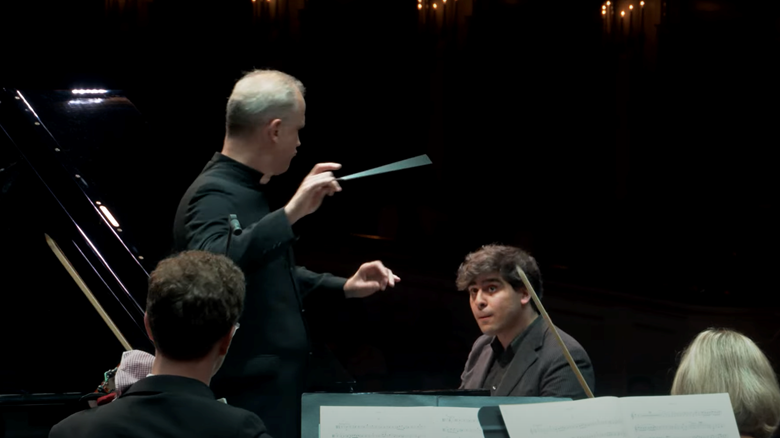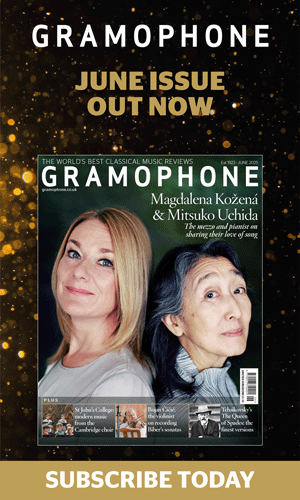Jed Distler's Cliburn Blog No 11: Back on Track
Jed Distler
Sunday, June 1, 2025
'A win/win performance for all parties concerned, including Mozart!'

Friday’s sometimes memorable yet generally inconsistent bounty contrasted with Saturday’s largely gratifying and often stimulating Semi-final recital and Mozart concerto rounds.
Each of the two recitals began with a major early 19th-century masterpiece and concluded with a seminal mid-20th-century sonata. Vitaly Starikov’s warm sound and pliable phrasing shifted the emphasis of Chopin’s Op 25 Études from the realm of technical studies to pure music. It wasn’t all perfect: I suspect that his occasional breaking of the line in the A flat major ‘Aeolian Harp’ stemmed from not wanting to hit a wrong note when faced with a quick melodic leap. And I wish the pianist had lightened up for the F major (No 3), the D flat major étude in sixths (No 8) and B minor étude in octaves (No 10); he clearly was trying too hard. And his sweeping arpeggios in the C minor No 12 lacked majesty and flexibility, as if the pianist was chasing the metronome. But he parsed the ‘stride piano’ cross-rhythmic phrases of the A minor No 4 wonderfully well and lovingly stretched out No 5’s central E major episode. Starikov’s No 6 made the case for those who claim that this étude’s true beauty lies within the left hand more than the challenging right-hand double thirds.
Following a lovely and richly texture Schubert/Liszt ‘Du bist die Ruh’, Starikov delivered a meticulously detailed yet thoroughly musical and brilliantly characterised Prokofiev Seventh Sonata. The first movement’s contrasts in legato and detaché phrasing were miracles of tonal and dynamic gradation, while the slow movement’s gentle bell tones created a hauntingly disembodied effect. Maybe Starikov’s Precipato finale came off stern more than playful, but, again, the contrasts in articulation stood out as they built the music’s narrative asymmetry to its inevitable points of climax.
Watch Vitaly Starikov's performance:
It took real gumption and nerve for Carter Johnson to conclude his set with Hindemith’s Third Piano Sonata, a work that one almost never hears in competitions, let alone on recital programmes, unless you’re Glenn Gould. Yet Johnson’s interpretation thoroughly revealed the substance behind the workmanship, starting with a lilting first movement full of meaningful melodic projection. The witty second movement came alive with inner-voice interplay and a balletic Trio section. And in contrast to the dynamically constricted, dry-as-dust Fugue I’ve heard from several well-estimated pianists on record, Johnson’s sense of joy and commitment permeated every note. His Hindemith alone deserves its own Gold Medal. I’d almost say the same for his imaginatively wrought Scriabin Preludes Op 74.
I’ll concede that Johnson’s subjective phrasings and microscopic details in Schumann’s Davidsbündlertänze may not be to everyone’s taste, and sometimes his rhythmic scansion was hard to follow. Yet the pianist’s assiduous transitions and genuine feeling for the music’s wild mood swings remained in my inner ear hours after the concert ended. It’s a slightly intellectualized reading, true, but one that’s informed by an authentic, searching pianistic voice. That said (and readers will know where I’m going with this), the jury’s elimination of Madgalene Ho in the Preliminaries deprived Cliburn followers the opportunity to hear the greatest Davidsbündlertänze interpretation now alive on Planet Earth.
Carter Johnson:
On to the evening’s final four Mozart concerto presentations. I’d be happy to encounter Angel Stanislav Wang’s pleasantly fluent and well-schooled D minor, K466, on a subscription series, although there’s more emotional turbulence in the outer movements and vulnerability in the slow movement than this young pianist projects. Listen to the Alfred Brendel/Charles Mackerras recording, or Edwin Fischer conducting the Philharmonia Orchestra from the keyboard, and you’ll hear what I mean.
Angel Stanislav Wang:
On the other hand, the directness and simplicity I found lacking in Piotr Alexewicz’s B flat major Concerto, K595, on Friday night were ever-present in Jonas Aumiller’s magnificent playing. His scaled-down dynamics more than met the orchestra half-way, with a real chamber aesthetic governing every phrase. The Fort Worth musicians under Carlos Miguel Preito also seemed much more responsive to their soloist here than they were with Alexewicz. If Carter Johnson’s K482 evoked Leon Fleisher and Richard Goode, Aumiller’s patrician musicianship and refinement in K595 were on par with Clifford Curzon. I also should mention Aumiller’s stylish improvisations in the Eingangs (assuming they were improvised), and his modulation machine of a first-movement cadenza.
Jonas Aumiller:
The concert’s second half opened with Yanjun Chen expounding more energy than necessary in the outer movements of the A major Concerto, K488, and tapering the tragic slow movement in what amounted to a pseudo-interpretation. I’d go so far as to say that the stumbles in the first movement directly resulted from the pianist’s lack of physical economy, as she bobbed to the music and occasionally conducted with a free hand.
Yanjun Chen:
Evren Ozel’s C major Concerto, K503, had everything that was missing from Yungrui Cai’s Friday performance: characterful differentiation between themes, scrupulous attention to Mozart’s accents and phrase markings, audible distinctions between leggiero and legato, and a true sense of collaboration, not to mention Ozel’s attractive, well-modulated sonority at all dynamic levels. Judging from the livestream camerawork, it appeared that Ozel and Preito were enjoying their time together onstage. Ozel kept flashing smiles at the conductor when a phrase resolved in a particularly eloquent way, or when imitative passages between soloist and orchestra took on unexpected conversational turns. In short, a win/win performance for all parties concerned, including Mozart!
Evren Ozel:
Gramophone is a Media Partner of The Cliburn International Piano Competition
















